- Home
- Richard Lee Byers
Prophet of the Dead: Forgotten Realms Page 13
Prophet of the Dead: Forgotten Realms Read online
Page 13
“But I wonder,” he said, “what the undead are doing here. As far as I know, the Running Rocks are pretty much uninhabited. I suppose the creatures could be maneuvering to attack Immilmar. But with the dark maze at their disposal, they shouldn’t need to pop out so far to the east and drag their war band through this terrain to accomplish that.”
“Unless you want to look for a different path north,” Orgurth said, “we’re going to be following them. Maybe we’ll see for ourselves what they’re up to.”
Keeping an eye out for rearguards, foragers, and the like, they did travel in the enemy’s footsteps. And before the sun reached its zenith, they started to hear a crashing at regular intervals, the noise echoing from somewhere up ahead.
“That’s a siege engine,” said Aoth, and Orgurth nodded. During his time as a legionnaire, the orc too, had likely heard a catapult or the equivalent battering relentlessly at a gate or section of wall. The slow but steady beat was the giveaway.
Later, well past midday, yet another impact triggered cries of excitement. Whatever barrier the undead had been assailing, it had just fallen.
As the sun disappeared behind the peaks to the west and the western sky turned red, Aoth reluctantly concluded that he and Orgurth weren’t likely to lay eyes on the battle before nightfall, and it would be stupid to push on after. They’d do better to focus on looking for a sheltered spot to camp, fuel for a fire, and something to eat.
Then, however, the trail curved around a mountainside to a place where a slope ran down to the long, broad saddle connecting the peak they were on to the one adjacent. Slipping and sliding, the undead and constructs had descended onto the ridge and taken up positions threatening the other mountain, or, more specifically, the cave mouths among the crags.
Granite panels or plugs sealed all the openings but one, and although Aoth had no difficulty recognizing the gates for what they were, they blended so well with the surrounding stone that he was impressed the undead had spotted them. They had, though, and over the course of the day, smashed one of the barriers to pieces.
Maybe hoping to undertake emergency repairs, men in masks appeared in the cave mouth. Undead archers drew their bows, and wizards lifted their wands and staves. A barrage of arrows and ragged shadow drove the defenders back.
“What do you see?” Orgurth asked. The action was too far away for even an orc to make out anything much with the light failing.
“Things I don’t understand,” Aoth replied. “I judged from the different styles of weapons, armor, and magic at the Fortress of the Half-Demon that my comrades and I were fighting a mixed force of reanimated Rashemi, Nars, and Raumvirans. The band below us is all Raumvirans.”
Orgurth shrugged. “Maybe after your victory, Raumvirans are all that are left.”
“I guess it’s possible. But here’s what’s really strange. The defenders up there in the caves are men in masks. Male hathrans. Except there’s no such thing.”
“That you’ve heard of.”
“Right. That I’ve heard of.” For a moment, Aoth felt profoundly tired of this backward land and its secrets.
“Well, whoever and whatever they are, what do we do now?”
Aoth wanted to say they’d keep heading north. He was as eager as ever to reach the Fortress of the Half-Demon, and with the undead down on the saddle conducting their siege, the way lay open.
But was that the right move?
He was no healer to aid in Jet’s recovery. Vandar and even Dai Shan were already venturing into the dark maze at regular intervals to search for Cera and Jhesrhi. If Aoth did reach the ruin, it would only be after tendays of travel, and once there, what was he likely to accomplish?
But suppose he took a hand in the confrontation fate had placed before him. He’d be doing what he’d promised the Wychlaran and the Iron Lord he’d do and in the process might uncover some genuine answers at last. And if the masked men were some sort of hathran, they might have magic to speed him on his way.
“We’re going to help break the siege,” he said, “and hope the folk in the caves make it worth our while.”
* * * * *
The berserker of the Owlbear Lodge scowled and jumped up from the bench. His thoughts sluggish with ale and firewine, Mario Bez tried to puzzle out how he might have given offense, then realized he’d already forgotten what he’d just said.
He also realized he didn’t care. He supposed the barbarians had been friendly to invite men of the Storm of Vengeance into their hall to drink with them, but as far as he was concerned, this oaf was being friendlier still by offering him the chance to vent his frustration with all things Rashemi.
He rose in his turn, and other men on both sides leaped up as well. Hands reached for sword hilts and axe handles, and, starting to invoke the rage that was their gift, berserkers gave the unmistakable cry, half hoot and half roar, of their totem animal.
The imminence of a general melee jolted Bez’s thinking into a belated clarity. Once someone spilled blood, there’d be no stopping it; he and his crewmen were outnumbered, and even had it been otherwise, he had nothing to gain and much to lose by falling out with his hosts.
“Stop!” he bellowed. “This is between this lad and me!” Then he removed his rapier and main gauche and laid them on the table amid the tankards, goblets, pitchers, and bottles.
The fellow he’d evidently insulted—a typical Rashemi warrior, dark-haired, scarred, burly, and of no more than medium height—set his hand-axe and dirk aside as well. Then the two of them moved to a clear space while other people turned to watch.
Bez started to circle, but the berserker apparently wasn’t a believer in taking one’s time and feeling out the opponent before attacking in earnest. No doubt hoping to overwhelm Bez in an instant, he bellowed and rushed in.
That kind of explosive aggression could be effective, but it couldn’t startle a seasoned sellsword into passivity. Bez twisted out of the way and drove a fist into the Rashemi’s kidney as he blundered past.
The berserker grunted, spun, and flung out his arm. The backhand blow clipped Bez in the temple but not quite hard enough to make him falter. He stepped in close and whipped his elbow into the Rashemi’s face. The man stumbled back a step.
Bez then punched him in the jaw, and that stung worse than the blow he’d taken to the head. His knuckles throbbed. But the Rashemi went down.
Bez almost succumbed to the urge to kick and stamp on him, but that too, might have had unfortunate consequences. Instead, he waited for the berserker to shake off his daze, then offered him a hand up.
The Rashemi smiled ruefully and accepted the gesture of renewed good fellowship, and the spectators cheered. Bez acknowledged their approval by grinning, waving, and clapping his erstwhile adversary on the shoulder.
Then the door at the end of the lodge hall opened, and as the assembled warriors noticed the figure framed in the opening, they fell quiet.
The new arrival was a hathran with staff in hand and layers of robe and mantle shrouding her form. Her polished wooden mask was a bland abstraction of the female face, expressionless except, perhaps, for the hint of an ambiguous smile at the corners of the mouth.
Which was to say, she looked little different than the other witches Bez had seen since landing in Rashemen. He couldn’t make out why, as he regarded her, he felt a chill. Maybe just because of the cold night air blowing in around her.
She met his gaze and crooked her finger.
Still uneasy, wondering what this portended, he grabbed his weapons and buckled them on. Melemer and Olthe looked up at him, asking without words if he wanted them to accompany him or do anything in his absence. He shook his head and then followed the masked woman out the door.
It was late, and a whistling wind tumbled fresh snow out of the north. As he and his companion strolled south toward the little river that wound through the center of town, they appeared to have the night to themselves.
“You blundered your way into that predicament back t
here,” the witch said after a while, “but you extricated yourself deftly too.”
He snorted. “Were you peeking in the window?”
“I see that despite the excitement,” she said, “you’re still a little drunk. Otherwise, I trust, you wouldn’t speak to a hathran disrespectfully. Give me your hand.”
Wondering if she intended to rap his knuckles like he was a naughty child, he obeyed, and she clasped his hand in her own. Her touch was so cold, it startled him, though once again, he supposed he could attribute that to the general chill in the air. Her skin was nearly as white as the snow spilling from the heavens and blanketing the town.
She murmured a charm, and his thoughts quickened, while a hint of numbness fell away from his limbs. He had still been a little tipsy, even if he hadn’t realized.
Releasing his hand, she asked, “Better?”
“Yes.”
“Good. Then we can confer like intelligent folk.”
“About what? Who are you?”
“Someone who hates seeing the champion of Rashemen cheated of his just reward.” They rounded a huddle of trees, sacred, in all likelihood, to some spirit or fey, and one of the old wooden bridges arching over the river came into view. She pointed with her staff and said, “Let’s talk in the center of that. The view is so pretty.”
And nobody, thought Bez, would be able to sneak up on them and eavesdrop.
The butt of her staff clicked on the planks, and the frozen river gleamed gray with Selûne’s light. They stood at the railing and looked west, toward the point where the watercourse emptied into the lake, although Bez couldn’t quite see that far in the dark.
“Now you can introduce yourself properly,” he said.
“Unfortunately, no,” she replied. “That would be unwise.”
He cocked his head. “You’ll pardon a soldier’s bluntness if I say secrecy doesn’t inspire trust.”
“How much do you know about the history of Rashemen, Captain? The last time the learned sisterhood split into factions, the consequences were grim. No witch would want to be accused of fomenting another such schism.”
“And yet you are?”
The masked woman hesitated in the manner of one choosing her words judiciously. “You’ll have heard tell that Yhelbruna is well over a hundred years old.”
“Yes, although not the reason for it.”
“A gift from some fey, I believe. She doesn’t talk about it. But all you need to know is that long-lived isn’t the same as immortal. Her powers and judgment are finally failing.”
“What a shame. But how can you tell?”
“You know the Iron Lord told her to perform divinations to establish the truth of your report. Has she reported back?”
“Not to my knowledge.”
“Because she can’t make the rituals work. In fact, when she tried in the Urlingwood, the magic went horribly wrong, and another hathran died as a result.”
“Again, I offer my regrets.”
“As far as her judgment is concerned,” the priestess continued, “surely you don’t need me to convince you she’s grown peculiar and obdurate, as old people sometimes do. There was no sane reason to hold up your reward.”
Bez turned toward her, brushed snow off the railing, and rested one elbow on the spot he’d cleared. “If others think the way you do, then why not divest the old girl of her responsibilities—gently and respectfully, of course—and pack her off to enjoy a well-earned retirement?”
“Some would not agree with me. Yhelbruna’s past achievements blind them to the current sad reality. And even if everyone did …” The hathran sighed. “An outlander like you once told me we Rashemi are slaves to our traditions, and I see now there’s truth in that. Yet it’s dangerous for the land to have a failing mind in charge. And you, Captain, will never have your due now that, by whatever perverse, suspicious reasoning, she has decided you don’t deserve it. Whereas if the ‘old girl’ no longer stood in your way …”
Bez shook his head in amazement. “You’re asking me to kill her?”
“It’s your trade, isn’t it?”
“War is my trade, and as a general rule, it’s neither good for business nor particularly safe for sellswords to turn on their employers. Besides, mightn’t Mangan and the other hathrans take Yhelbruna’s bloody corpse as evidence the undead aren’t really gone?”
“Then don’t bloody it. Make it look like her tired old heart simply stopped beating, or she broke her neck in a fall. Or make sure the body’s never found. My friends and I can put about the suggestion that, upset over what happened in the Urlingwood, she went into seclusion to pray. The point is that when she’s no longer around to object, Mangan will give you the griffons.”
Bez grinned. “And some other hathran will have to rise from the ranks and take command.”
“I told you, my concern is for my country, not my personal ambitions.”
“Certainly.” Standing up straight again, he pondered her proposal.
Obviously, it carried an element of risk, but so did simply waiting around in Immilmar. The berserkers of the Griffon Lodge, their deer-man allies, Dai Shan, and Aoth Fezim’s familiar were all safely dead, but he couldn’t be quite as certain about the Thayan himself, or Jhesrhi Coldcreek and Cera Eurthos. Unlikely as it seemed, they could conceivably still turn up, or some busybody could discover by some other means that Mario Bez wasn’t really the savior of Rashemen but rather the man who’d slaughtered its true benefactors to steal the credit.
He drew breath to give his companion his answer, and then his eyes widened in surprise.
Apparently, as he’d deliberated, he’d briefly lost track of anything other than his own musings. In that moment, the witch had disappeared.
He looked at both ends of the bridge and all around. He still couldn’t see any cloaked and hooded figures, just a stray wisp of mist curling over the ice.
He snorted, mildly amused but annoyed as well. He preferred being the trickster, not the dupe, and it nettled him that the witch believed she could read him so well that she needn’t wait for a verbal reply.
Still, it wasn’t worth fretting over. Especially when there was work to be done, or rather, assigned.
He tramped back to the Owlbear Lodge, where all was now raucous conviviality, with some men booming out a song and other stamping, whirling, and tossing their blades back and forth in a sword dance. Looking in the doorway, he beckoned Melemer and Olthe forth as the witch had beckoned him.
The little warlock possessed a deviousness that lent itself well to assassination. The battleguard was a more forthright personality, but she’d follow Melemer’s lead if Bez told her to, and to say the least, it seemed unlikely that Yhelbruna could withstand both of them.
* * * * *
One of the constructs was a long-armed, short-legged giant with a bestial face that reminded Aoth of demons he’d fought in the past. Leaning forward on its knuckles, it had been standing motionless ever since he and Orgurth had first peered down at the Raumathari war band. But now, abruptly, gleaming in the starlight, it stood up straight and held out an upturned hand. Something black began to accumulate there either created in every sense of the word or drawn from elsewhere.
“There we go,” Aoth murmured.
“What?” Orgurth replied.
“I’ve identified their siege engine. Apparently, it needed to renew its power, but now it’s ready to resume the bombardment.”
“The undead already made one breach. I expected them to charge it already.”
“So did I. They generally don’t hesitate to make a run at the living. But their tactics are sound. The more holes they poke, the harder it becomes for the defenders to block them all.”
The orc grunted. “So you want to stop the statue?”
“Yes.”
Ever since Aoth had decided to intervene in the siege, he’d been looking for a way to make a difference. For all his toughness, Orgurth was just one warrior, and while Aoth wielded potent magic, h
e was just one war mage against a small army no doubt made up in part of others with comparable skills. He would, moreover, have only one chance to attack by surprise. Afterward, attempting any sort of aggressive action without falling victim to an overwhelming reprisal would be more difficult.
It made sense to use that chance to destroy the enemy’s most powerful weapon. If Tymora smiled, he might even surprise the Raumvirans controlling the construct and destroy them as well.
“How are you at walking like a dead man?” he asked.
Orgurth eyed him. “Are you joking?”
“I’ll need to use a more powerful spell than I can throw from this far away, and truly, the trick should work. This is an empty wasteland. The Raumvirans have no reason to expect any foes to come sneaking up behind them, and even if they do have lookouts posted, the average dread warrior isn’t all that observant.”
“You never told me what being a Brother of the Griffon pays. I hope it’s a lot.”
Orgurth tugged his cowl down to shadow as much of his face as possible. Then he practiced a stiff-legged walk and gave an experimental moan.
Aoth winced. “Don’t make noise. You don’t sound right. Sway and lurch a little, but don’t overdo it.”
He adjusted his own hood as the orc had. Then he and Orgurth clambered down the slope and trudged on toward the ranks of the enemy.
As he’d hoped, none of the foe paid the newcomers any attention. All the Raumvirans, or at least all the common zombies and walking skeletons, were watching the Rashemi stronghold with the single-minded patience of the dead.
While he and Orgurth made their approach, the black substance finished congealing in the metal giant’s palm, forming a ball so round and smooth that any artilleryman would have gladly loaded it into an onager or mangonel. The construct cocked its arm, whipped it forward, and stepped, just like a human being would, to put all his strength behind a throw.
The missile flew not at one of the sealed cave mouths but at the breached one where, no doubt hoping darkness would afford a measure of protection, masked Rashemi were stacking pieces of stone. Their half-finished barricade shattered, and those struck by flying rock cried out.

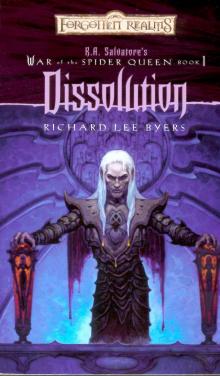 Dissolution
Dissolution Arkham Horror- Ire of the Void
Arkham Horror- Ire of the Void The Haunted Lands: Book II - Undead
The Haunted Lands: Book II - Undead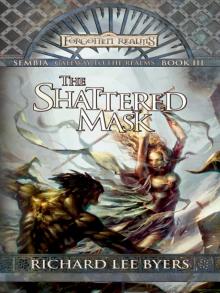 The Shattered Mask
The Shattered Mask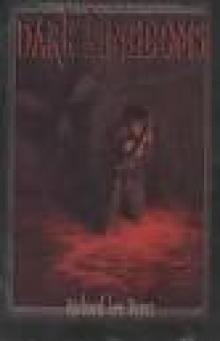 Dark Kingdoms
Dark Kingdoms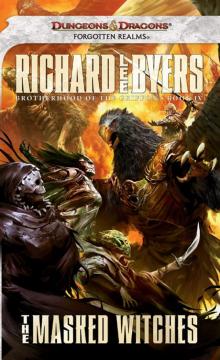 The Masked Witches: Brotherhood of the Griffon, Book IV
The Masked Witches: Brotherhood of the Griffon, Book IV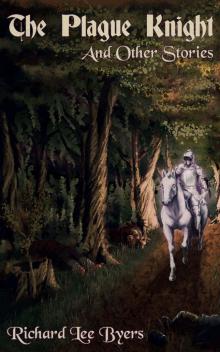 The Plague Knight and Other Stories
The Plague Knight and Other Stories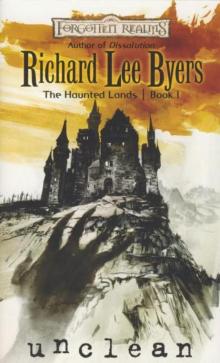 Unclean: The Haunted Lands
Unclean: The Haunted Lands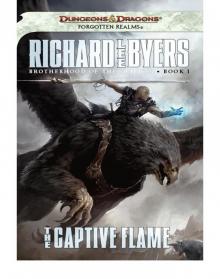 The Captive Flame: Brotherhood of the Griffon • Book 1
The Captive Flame: Brotherhood of the Griffon • Book 1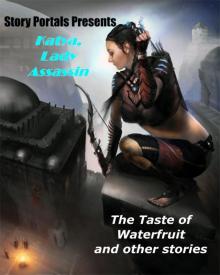 The Taste of Waterfruit and Other Stories (Story Portals)
The Taste of Waterfruit and Other Stories (Story Portals)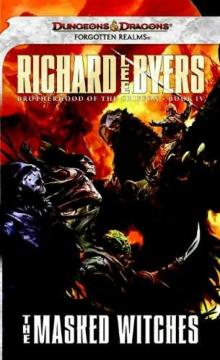 The masked witches botg-4
The masked witches botg-4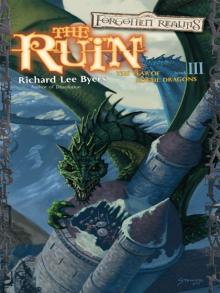 The Ruin
The Ruin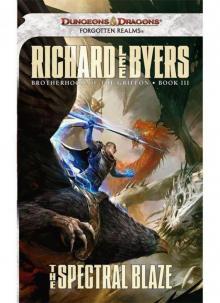 The Spectral Blaze botg-3
The Spectral Blaze botg-3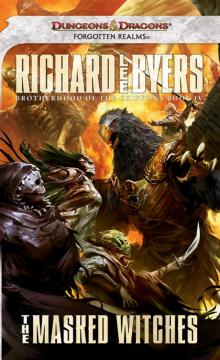 The Masked Witches
The Masked Witches Blind God's bluff bf-1
Blind God's bluff bf-1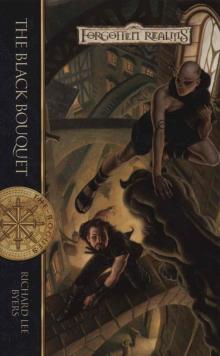 The Black Bouquet r-2
The Black Bouquet r-2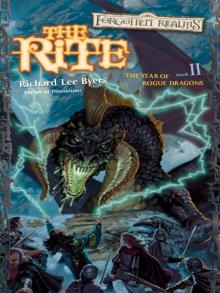 The Rite
The Rite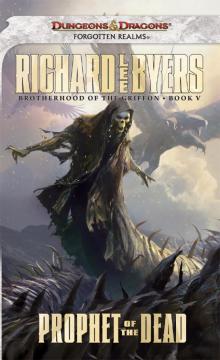 Prophet of the Dead: Forgotten Realms
Prophet of the Dead: Forgotten Realms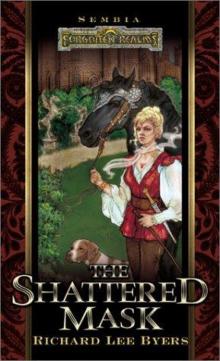 The Shattered Mask s-3
The Shattered Mask s-3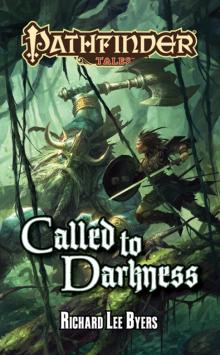 Called to Darkness
Called to Darkness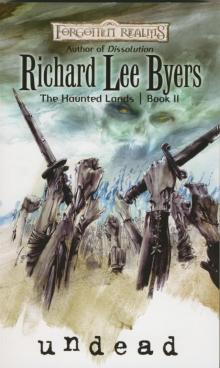 Undead hl-2
Undead hl-2 Blind God's Bluff: A Billy Fox Novel
Blind God's Bluff: A Billy Fox Novel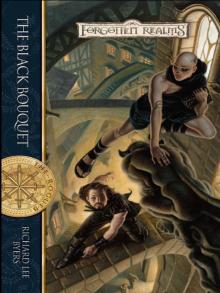 The Black Bouquet
The Black Bouquet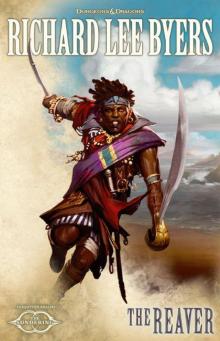 The Reaver
The Reaver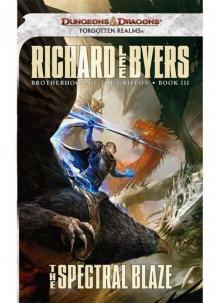 The Spectral Blaze: A Forgotten Realms Novel
The Spectral Blaze: A Forgotten Realms Novel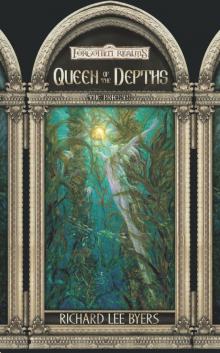 Queen of the Depths
Queen of the Depths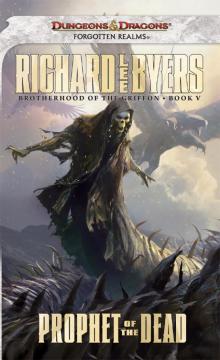 Prophet of the Dead botg-5
Prophet of the Dead botg-5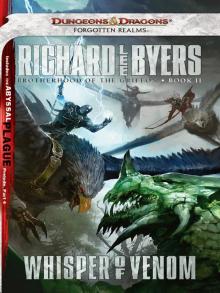 Whisper of Venom: Brotherhood of the Griffon, Book II
Whisper of Venom: Brotherhood of the Griffon, Book II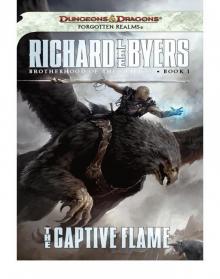 The Captive Flame botg-1
The Captive Flame botg-1 The Haunted Lands: Book III - Unholy
The Haunted Lands: Book III - Unholy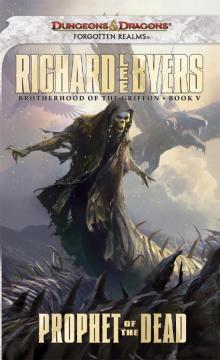 Prophet of the Dead
Prophet of the Dead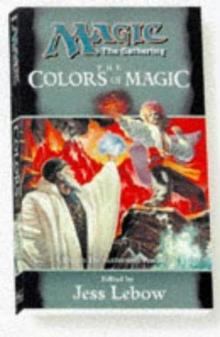 The Colors of Magic Anthology (magic: the gathering)
The Colors of Magic Anthology (magic: the gathering)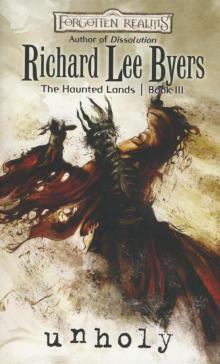 Unholy hl-3
Unholy hl-3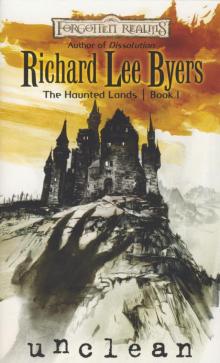 Unclean hl-1
Unclean hl-1 Blind God's Bluff
Blind God's Bluff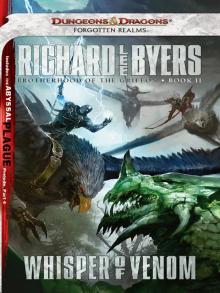 Whisper of Venom botg-2
Whisper of Venom botg-2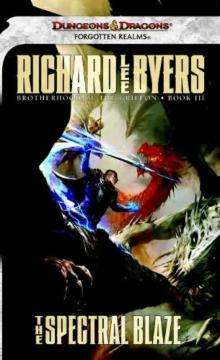 The Spectral Blaze
The Spectral Blaze